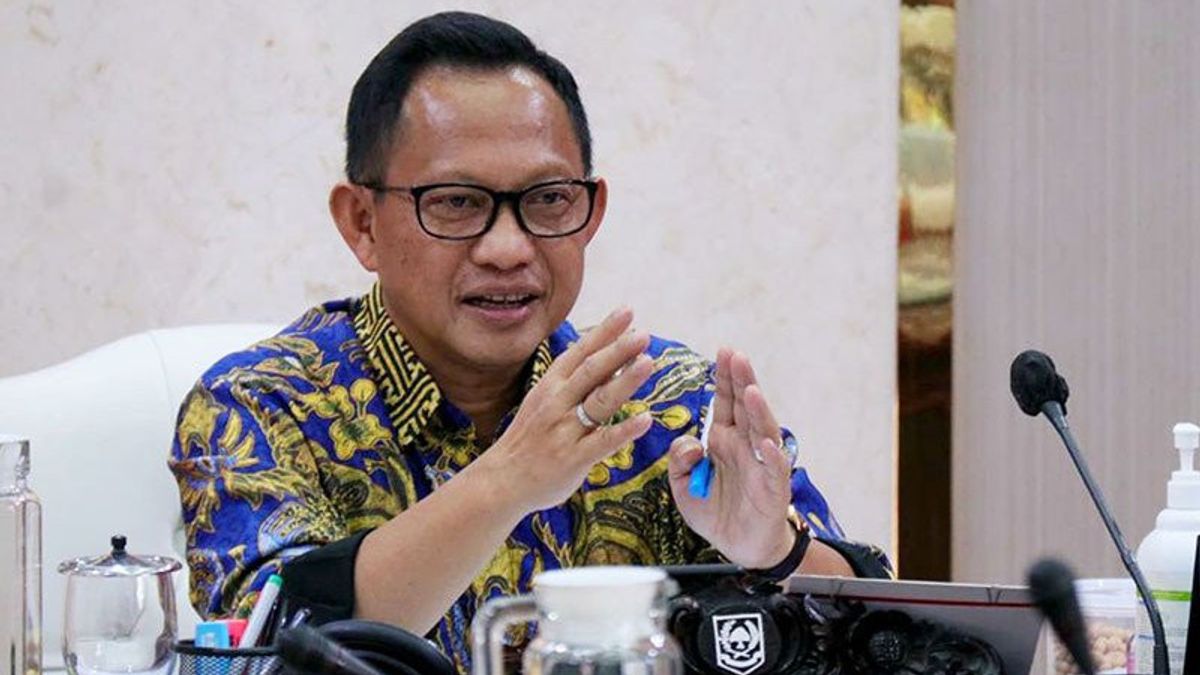JAKARTA - Minister of Home Affairs (Mendagri) Tito Karnavian issued Minister of Home Affairs Instruction Number 6 of 2020 concerning Enforcement of Health Protocols for Controlling COVID-19.
Reported by Antara, Thursday, November 19, Director General (Dirjen) of Regional Administration Development (Adwil) Safrizal said, in his instructions, the Minister of Home Affairs warned of sanctions for regional heads who ignore their obligations as regional heads.
According to Safrizal, the instruction was a follow-up to President Jokowi's directive at a closed cabinet meeting Monday, November 16 at the Merdeka Palace in Jakarta.
During the cabinet meeting, President Jokowi emphasized the importance of consistent compliance with the COVID-19 health protocol and prioritizing the safety of the people.
"The COVID-19 pandemic is a global and national non-natural disaster, so that in order to control the pandemic and its social and economic impacts, approximately 8 months the Central Government, regional governments and all non-governmental and community elements have worked hard to solve the problem. this nation, "he said.
To deal with COVID-19 and its effects, said Safrizal, the central and regional governments have issued a number of regulations, both in the form of government regulations, presidential regulations, ministerial regulations, regional regulations, and regional head regulations.
Various steps have also been carried out systematically and massively at large costs, including from people's taxes, including socialization efforts to wear masks, regulating distance, providing hand washing facilities and efforts to prevent crowds.
"Likewise, efforts have been made to increase the capacity of '3T' (testing, tracing and treatment)," he said.
Not only that, according to Safrizal, several regions have also established strategies, including large-scale social restrictions (PSBB) which include preventing large-scale crowds.
According to him, in the instruction the Minister of Home Affairs reminded regional heads to appreciate the hard work and dedication of even the lives of the fighters who had died.
Especially, doctors, nurses, other medical personnel, members of the National Police, TNI and volunteers as well as various elements of society who have worked hard to tackle COVID-19.
"So in order to improve the control of the spread of COVID-19 and to follow up on the President's direction, the Minister of Home Affairs feels the need to issue instructions for regional heads," he said.
Instruction of the Minister of Home Affairs Number 6 of 2020, said Safrizal, of course, taking into account the provisions of the laws and regulations, among others, Law Number 4 of 1984 concerning Contagious Disease Outbreaks.
Then, Law Number Law Number 9 of 2015 concerning the Second Amendment of Law Number 23 of 2014 concerning Regional Government, Law Number 6 of 2018 concerning Health Quarantine, Government Regulation Number 21 of 2020 concerning Large-Scale Social Restrictions in the Context of Accelerating Handling of Covid-19.
Likewise, Presidential Regulation Number 82 of 2020 concerning the Committee for Handling COVID-19 and National Economic Recovery, Regulation of the Minister of Health Number 9 of 2020 concerning Guidelines for Large-Scale Social Restrictions in Handling COVID-19 and Regulation of the Minister of Home Affairs Number 20 of 2020 concerning Acceleration of Handling COVID-19 in the Local Government Environment.
"Based on that, fast, precise, focused and integrated steps are needed between the Central Government and regional governments in responding to the policies that have been issued to be obeyed to prevent the spread of COVID-19 in the regions, in accordance with the provisions of laws and regulations," he said .
For that, he said, the Minister of Home Affairs issued Minister of Home Affairs Instruction Number 6 of 2020. There are several points instructed by the Minister of Home Affairs to all regional heads in the Minister of Home Affairs Instruction Letter Number 6 of 2020.
"First, consistently enforce the COVID-19 health protocol to prevent the spread in each area in the form of wearing masks, washing hands properly, maintaining distance, and preventing crowds that could potentially violate the protocol," he explained.
Second, continued Safriza, regional heads were instructed to take proactive steps to prevent transmission of COVID-19 and not only act responsively or reactively. To prevent is better than to act.
Prevention can be carried out by humanist means and action including crowd dispersal is carried out in a firm and measured manner as a last resort.
Third, regional heads as the highest government leaders in their respective regions must be role models for the community in complying with the COVID-19 health protocol, including not participating in crowds that have the potential to violate health protocols.
"Fourth, that according to Law No. 23/2014 on Regional Government, regional heads are reminded of the obligations and sanctions for regional heads," he said.
Safrizal explained the sanctions stipulated in the Regional Government Law. He said, Article 67 letter b, the Regional Government Law states that they comply with all provisions of statutory regulations.
So, said Safrizal based on instructions in the fourth dictum, regional heads who violate the provisions of the legislation can be subject to sanctions up to dismissal.
This effort is in order to continue to maintain discipline in upholding health protocols so that the efforts that have been achieved can be improved.
The English, Chinese, Japanese, Arabic, and French versions are automatically generated by the AI. So there may still be inaccuracies in translating, please always see Indonesian as our main language. (system supported by DigitalSiber.id)













